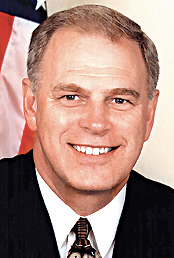Strickland hopes buying in bulk will yield savings

Ohio Governor Ted Strickland (D-Lisbon)
A chief procurement officer will be hired to coordinate purchasing.
COLUMBUS (AP) — Gov. Ted Strickland ordered state agencies Wednesday to buy everything from paper clips to airplane propellers as a group when possible, saying it could save up to $72 million a year.
It’s Strickland’s latest attempt to rein in spending and avoid further layoffs and cuts in government services in the face of a projected budget shortfall of at least $733 million over the next year.
State agencies spend $3.5 billion a year on the supplies and services they need to operate. Strickland plans to hire a chief procurement officer to coordinate purchasing. To save more money, he is inviting the state’s colleges and local governments to join in when they can.
Strickland also signed an order setting a goal of 15 percent of state contracts going to minority-owned businesses and 5 percent to a program for socially and economically disadvantaged businesses.
States with bulk-buying habits have saved millions of dollars, Strickland said.
“They have achieved savings that have far exceeded our conservative estimates,” Strickland said at a news conference announcing the plan.
Ohio could save $54 million to $72 million each year once the program is in place, he said.
Each agency will have its own procurement officer charged with coordinating purchasing through the Department of Administrative Services, which will control the buying through the chief procurement officer.
The consolidation was the chief recommendation of the Procurement Reform Working Group, a panel of private sector representatives and staffers from state universities and legislative and governor’s offices. Their report was issued in April.
The programs for minority and disadvantaged businesses will be closely monitored and scorecards will be issued regularly, Strickland said.
The planned percentage of minority contracts for the current budget year range from 9 percent at the Ohio Environmental Protection Agency to 15.5 percent at the Department of Taxation. Planned participation in the program for disadvantaged businesses ranges from several agencies at 5 percent to 69 percent at the Department of Mental Health.
State Sen. Ray Miller, a black Columbus Democrat, said he has watched the minority program grow from a 2 percent set-aside requirement to where it is today.
“We have some new energy from this administration,” Miller said.
 43
43
